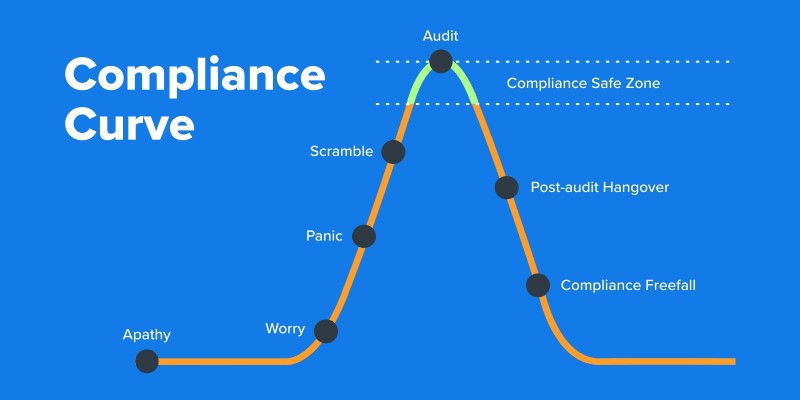Is FM regulation a constant, ticking time-bomb in your business? Here’s how a CAFM can save you from the worry and last-minute compliance scrambles that so many businesses fall victim to.
When compliance is a ticking FM time bomb
You may have processes in place to meet H&S regulations, but you may also have a sneaking suspicion they aren’t always followed. As inspections and audits loom, the ticking gets louder. After weeks of worry, you wade in and pull the documentation together. You correct mistakes, prepare for audit and pass the inspection… only for the whole cycle to start up again.
Is compliance creeping up on you?
It doesn’t have to be like this.
Getting trapped in the grooves of the ‘compliance curve’ is a common problem, but it isn’t inevitable. And it’ll become a more dangerous place to be with the tightening regulation and rise in penalties for companies who breach the rules.
Compliance is a bigger deal than ever before
Across every aspect of FM compliance is becoming more demanding. Not least in fire safety.
Following the Grenfell scandal, governments and agencies have been looking for more fail-safe compliance routines to mitigate risk in building management. And regulation is finally catching up with ambition. With the changes to the RRO 2005 (Regulatory Reform Order), fire safety legislation has undergone its biggest change in 60 years. For many FM, there are new requirements for:
- Risk assessment
- Accountability
- Record keeping
- Training
- Continual review
But fire safety is just one element of a tightening web of H&S regulation that FMs are expected to have a handle on. And it’s a web of regulation that is impossible to properly navigate without digitising and automating the way FMs work.
These days it’s simply not enough to try and back-solve compliance requirements in time for audits and inspections. Compliance has to become ‘the way you do things’ as a business. And here’s how FM can software can help.
4 ways a CAFM helps compliance become ‘the way you do things’
1. Automation
You may have processes in place to meet statutory compliance requirements. But how do you know they’re actually being followed and documented in real-time?
CAFM Software can automate many of the tasks involved in managing compliance documents, scheduling regular internal inspections, and flagging any issues. Automating workflows can help ensure you are completing and collating all necessary paperwork. It can fire off reminders and notifications when checks are due. It can ensure that tasks are carried out in a consistent way and gaps or omissions won’t creep into your process.
2. Organisation
How much time is lost every year in labelling, filing, and collating compliance documentation?
CAFM software helps you to store all your compliance documents in a central location, making it easier for all parties to access and manage them.
This can help reduce the risk of documents getting lost or misplaced. It can demonstrate to auditors that vital information is accessible and discoverable by the people in your business who need to use it most.
3. Accountability
CAFM software tracks and monitors compliance activities. It can show when work was carried out, by whom, and when. It can show you, at a glance, when documentation is missing and checks have not been carried out. Real-time tracking and record keeping with a CAFM makes it easier to identify any issues and take corrective action. It demonstrates to auditors that you are in control of people and process.
CAFMs help improve accountability and reduce the risk of non-compliance.
4. Efficiency
Effective compliance is all about efficiency. It’s about setting up processes that workers are able to easily understand and follow. But every organisation has different needs and every compliance routine is different. Some CAFMs have ‘one size fits all processes’ that you can't just tweak and customise.
Instead choose a CAFM that lets you set up custom workflows to support the unique way your business operates. This can make the difference between compliance routines that become embedded in your organisation and bureaucratic processes that are overcomplicated and ignored.
A CAFM can help save you and your colleagues hours every week through automation and digitisation. It can help compliance become the ‘way you do things’ as a business. It can reduce the time, money and stress of holding compliance together using Excel Sheets and will-power alone.
But clunky CAFM systems with complex and slow interfaces can have exactly the opposite effect. They can add so many layers of bureaucracy to your organisation that workers end up actively avoiding using them. They can end up trapping you forever in the FM compliance curve, as you pull together documentation retrospectively within unused compliance platforms just to get you through an audit.
If you want to escape the groves of the compliance curve with a digital solution, make sure your chosen software can be as agile and responsive as you need it to be.
.png?width=680&height=700&name=Ai%20page%20module%20(2).png)



